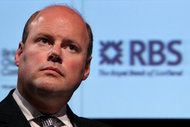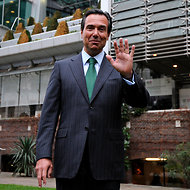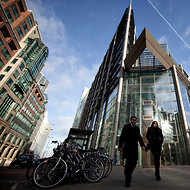LONDON — The Bank of England made good on its pledge to keep interest rates low on Thursday, amid signs that Britain’s economic recovery was picking up steam.
The British central bank kept its benchmark interest rate unchanged at a record low of 0.5 percent. It also said it would hold its program of economic stimulus at £375 billion, or $580 billion.
After avoiding a triple-dip recession at the beginning of the year, the British economy started to recover. Relatively low borrowing costs, a buoyant housing market and an improvement of the economic situation in the euro zone, Britain’s largest export market, pushed growth to 0.7 percent in the three months that ended June 30.
But the Bank of England governor, Mark J. Carney, and some economists have warned that the current speed of the recovery, though encouraging, is unlikely to be sustainable.
“In the near term, we will get pretty strong growth,” said Jens Larsen, an economist at RBC Capital Markets. “Looking ahead, I don’t think we’ll have that very fast cyclical recovery that this would suggest. Wages, income in general and the level of indebtedness are still headwinds.”
The bank said Thursday it would reinvest proceeds from £1.9 billion worth of maturing British government bond purchased under its asset-buying program in keeping the overall size of the economic stimulus at £375 billion.
Mr. Carney, the former Canadian central bank governor who moved to the Bank of England in July, said in a speech last month that the outlook for British growth had “improved considerably in recent months” but that the prospects over the next three years were “solid, not stellar.” The pace of recovery is widely expected to slow at the beginning of next year.
In July, Mr. Carney pledged to keep interest rates at a record low of 0.5 percent until unemployment fell to 7 percent; it currently is at 7.8 percent. The pledge, called forward guidance, is supposed to help fuel the economic recovery by creating certainty among borrowers about the affordability of debt in the near term.
But Rob Wood, chief economist for Britain at Berenberg Bank in London, said in a note that he expected unemployment to reach 7 percent in the third quarter of 2015.
“This is a faster decline than the BoE expects, so the first rate rise is probably coming sooner than Mark Carney has argued,” Mr. Wood wrote. “Output is still 3 percent lower than it was in 2007, and there are 732,000 more part-time workers who want but cannot get a full-time job. So recovering demand growth will result in a jobs-lite recovery rather than rapidly falling unemployment.”
Nick Beecroft, chairman and senior market analyst at Saxo Capital Market, noted that the bank’s statement on Thursday made “no attempt to fight the market’s judgment that rates will be on the increase long before the bank’s doomed forward guidance would have us believe.” He predicted that “rates will be on the rise in late 2014.”
The Organization for Economic Cooperation and Development said Tuesday that the economic outlook in countries like Britain, the United States and Japan had improved and that a “moderate recovery” was under way. Growth in Britain was “picking up more vigorously than expected,” and the euro area as a whole was no longer in recession, the O.E.C.D. said.
According to one survey, the British manufacturing sector grew to the highest level in more than two years in August. Yet some economists worried that growth was bolstered only by stoking the British property market.
Britain’s construction industry grew last month at the fastest pace in six years and faster than some economists had expected, according to Markit Economics and the Chartered Institute of Purchasing and Supply. Construction of residential homes was the best-performing section of the industry. In a separate survey, Markit said the British manufacturing sector grew to the highest level in more than two years in August.
The value of homes has been rising, helped by low interest rates and a government program to help first-time buyers. House prices increased at the fastest pace since 2010 in July, according to Hometrack, a property research concern. Home builders, including Persimmon and Barratt Homes, have reported higher sales over the last three months and stepped-up the construction of new homes.

Article source: http://www.nytimes.com/2013/09/06/business/global/bank-of-england-holds-rate-at-already-low-level.html?partner=rss&emc=rss



